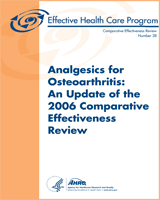NCBI Bookshelf. A service of the National Library of Medicine, National Institutes of Health.
Chou R, McDonagh MS, Nakamoto E, et al. Analgesics for Osteoarthritis: An Update of the 2006 Comparative Effectiveness Review [Internet]. Rockville (MD): Agency for Healthcare Research and Quality (US); 2011 Oct. (Comparative Effectiveness Reviews, No. 38.)

Analgesics for Osteoarthritis: An Update of the 2006 Comparative Effectiveness Review [Internet].
Show detailsThe Agency for Healthcare Research and Quality (AHRQ) conducts the Effective Health Care Program as part of its mission to organize knowledge and make it available to inform decisions about health care. As part of the Medicare Prescription Drug, Improvement, and Modernization Act of 2003, Congress directed AHRQ to conduct and support research on the comparative outcomes, clinical effectiveness, and appropriateness of pharmaceuticals, devices, and health care services to meet the needs of Medicare, Medicaid, and the Children’s Health Insurance Program (CHIP).
AHRQ has an established network of Evidence-based Practice Centers (EPCs) that produce Evidence Reports/Technology Assessments to assist public- and private-sector organizations in their efforts to improve the quality of health care. The EPCs now lend their expertise to the Effective Health Care Program by conducting comparative effectiveness reviews (CERs) of medications, devices, and other relevant interventions, including strategies for how these items and services can best be organized, managed, and delivered.
Systematic reviews are the building blocks underlying evidence-based practice; they focus attention on the strength and limits of evidence from research studies about the effectiveness and safety of a clinical intervention. In the context of developing recommendations for practice, systematic reviews are useful because they define the strengths and limits of the evidence, clarifying whether assertions about the value of the intervention are based on strong evidence from clinical studies. For more information about systematic reviews, see http://www.effectivehealthcare.ahrq.gov/reference/purpose.cfm
AHRQ expects that CERs will be helpful to health plans, providers, purchasers, government programs, and the health care system as a whole. In addition, AHRQ is committed to presenting information in different formats so that consumers who make decisions about their own and their family’s health can benefit from the evidence.
Transparency and stakeholder input from are essential to the Effective Health Care Program. Please visit the Web site (http://www.effectivehealthcare.ahrq.gov) to see draft research questions and reports or to join an e-mail list to learn about new program products and opportunities for input. Comparative Effectiveness Reviews will be updated regularly.
We welcome comments on this CER. They may be sent by mail to the Task Order Officer named below at: Agency for Healthcare Research and Quality, 540 Gaither Road, Rockville, MD 20850, or by e-mail to vog.shh.qrha@cpe.
Carolyn M. Clancy, M.D.
Director, Agency for Healthcare Research and Quality
Jean Slutsky, P.A., M.S.P.H.
Director, Center for Outcomes and Evidence
Agency for Healthcare Research and Quality
Stephanie Chang M.D., M.P.H.
Director, EPC Program
Center for Outcomes and Evidence
Agency for Healthcare Research and Quality
Carmen Kelly, Pharm.D.
Task Order Officer
Center for Outcomes and Evidence
Agency for Healthcare Research and Quality
- Preface - Analgesics for OsteoarthritisPreface - Analgesics for Osteoarthritis
Your browsing activity is empty.
Activity recording is turned off.
See more...